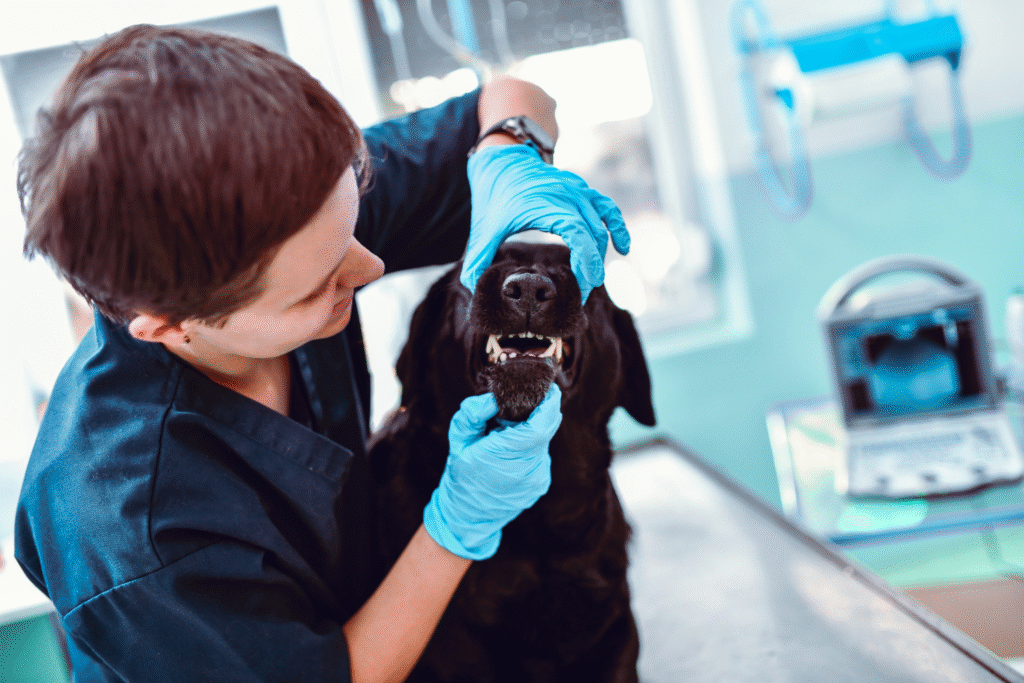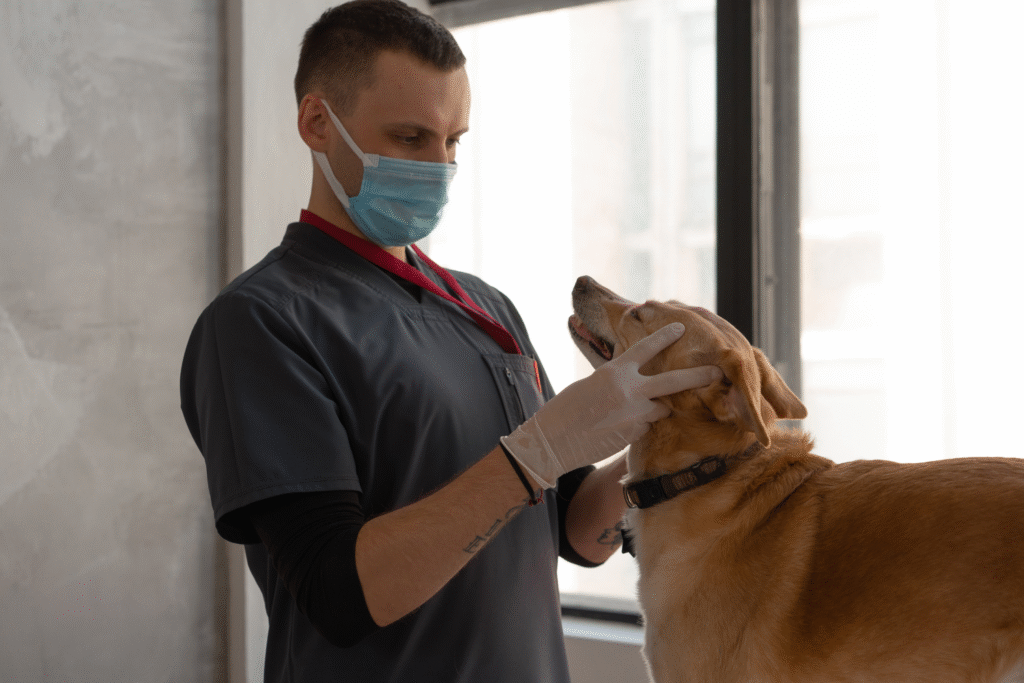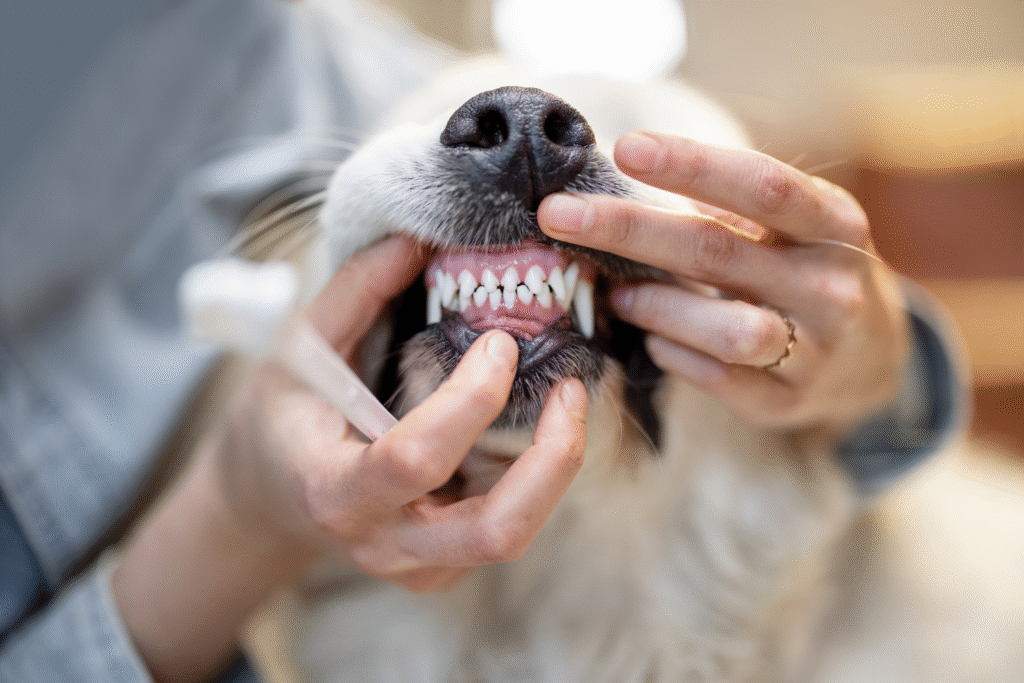What your dog’s bad breath might really mean.

“Dog breath” might sound harmless, but it can actually be one of the most overlooked health warnings in veterinary medicine. A sudden change in odor, intensity, or even the type of smell can signal trouble not just in the mouth but across multiple organs. Modern veterinary research is now linking specific breath patterns to dental disease, diabetes, liver failure, and kidney dysfunction. The nose knows more than we think, and in many cases, that faint odor you notice after playtime could be your first clue that something deeper is wrong.
1. Persistent bad breath often points to periodontal disease.

According to the American Veterinary Dental College (AVDC), more than 80 percent of dogs over age three show signs of dental or gum disease—and bad breath is usually the first symptom. Plaque builds on the teeth, bacteria multiply, and toxins inflame the gums, creating a smell that brushing alone can’t fix. Left untreated, bacteria can spread through the bloodstream to affect the heart and kidneys. When that signature sour odor lingers day after day, it’s not just unpleasant; it’s an early warning of infection hiding below the gumline.
2. Breath resembling ammonia or urine can signal kidney failure.

When kidney function declines, waste products such as urea accumulate in the blood. Those compounds escape through the mouth, creating a metallic or ammonia-like smell that some owners describe as “urine breath”, as stated by the Merck Veterinary Manual from Merck Animal Health. This is more than an odor issue—it’s a biochemical flag that toxins are circulating where they shouldn’t be. The scent often appears alongside weight loss, fatigue, and excessive drinking. Early detection through that distinctive smell gives veterinarians a crucial head start in managing chronic kidney disease.
3. Sweet or fruity breath may point toward diabetes mellitus.

Veterinary endocrinologists at Cornell University have shown that dogs with uncontrolled diabetes often exhale ketones, which produce a sweet, almost fruity odor. Those ketones are by-products of fat breakdown when the body can’t use glucose properly. The result is a scent that owners might describe as “grape-like” or “maple syrup-ish.” If that smell accompanies frequent urination, extreme thirst, or weight loss despite a good appetite, it’s time for bloodwork. That sweet breath isn’t charming—it’s chemistry revealing a metabolic crisis.
4. Rotting or putrid breath can mean oral infection or tumors.

When your dog’s mouth smells like decay or raw meat, it may indicate deep infection, tooth abscess, or even an oral tumor. Bacteria trapped in gum pockets or tissue breakdown beneath the surface release sulfur compounds that produce those offensive gases. This type of breath doesn’t fade with dental chews; it worsens until the root cause is treated. Because oral cancer in dogs can spread quickly, any worsening smell or unexplained bleeding should send you straight to the vet.
5. Fecal-smelling breath sometimes hints at gastrointestinal trouble.

If your dog’s breath suddenly mimics feces, it might not be their diet—it could be reflux, intestinal imbalance, or even a blockage. Gastrointestinal bacteria release volatile compounds that travel upward, escaping through the mouth. You might also see bloating, diarrhea, or vomiting. When stomach contents backflow regularly, the odor lingers no matter how much brushing you do, signaling it’s time for a deeper medical look.
6. A musty or fishy scent could suggest liver dysfunction.

The liver filters toxins; when it falters, sulfuric and fishy smells can leak into the breath. This odor is often paired with yellowing gums or eyes (jaundice) and loss of appetite. The breath of a dog in liver distress has a distinctly sour tang that doesn’t respond to dental care because it comes from the bloodstream, not the mouth. Recognizing that difference can save critical time before liver damage becomes irreversible.
7. Diet changes can shift microbial balance in the mouth.

Sometimes the culprit isn’t disease but diet. High-protein or raw diets can alter bacterial populations in the oral cavity, creating stronger odors. While short-term shifts are normal, persistent foul smells suggest that certain ingredients are upsetting your dog’s digestive or microbial balance. Tracking when the smell changes—after new treats or foods—can help you and your vet determine whether nutrition or infection is to blame.
8. Odor accompanied by drooling or pawing at the mouth indicates pain.

When dogs start pawing at their muzzle or drooling excessively alongside bad breath, the issue is often painful dental inflammation or an abscess. Dogs hide pain well, so behavioral clues like this can speak louder than visible symptoms. Observing these signs together with odor changes helps vets localize the problem before more serious complications set in.
9. Older dogs with worsening breath may face systemic disease.

As dogs age, multiple organ systems slow down, and the compounds they release through respiration change too. What begins as mild halitosis can evolve into a telltale sign of systemic illness—kidney, liver, or endocrine disorders being the most common. For senior dogs, a breath check at every wellness visit can reveal more than any external symptom.
10. Consistent breath changes despite dental care always need investigation.

If your dog’s breath remains foul after regular cleanings, brushing, and healthy food, something deeper is going on. Chronic halitosis that resists treatment is one of the most reliable early warnings of internal disease. Because breath reflects the bloodstream’s chemistry, any change that lingers deserves diagnostic testing. Paying attention to what your dog’s mouth is saying can give them a longer, healthier life—and that’s worth listening to.
